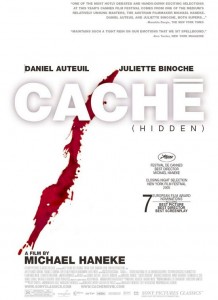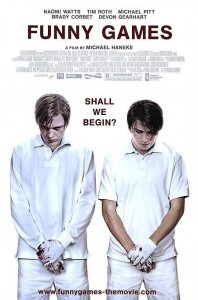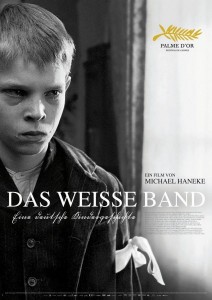#8. Caché (2005) / Funny Games (2008) / (?) The White Ribbon (2009)
(director: Michael Haneke; starring (Caché) Daniel Autueil and Juliette Binoche; (Funny Games) Naomi Watts, Tim Roth, Michael Pitt and Brady Corbet)
At one point Austrian director Michael Haneke must have realized that the important relationships in a movie aren’t those that happen between the characters on the screen, but between the audience and the screen itself. This dynamic is most clearly apparent in his 2008 anti-horror film Funny Games (which itself was remade from his own 1997 German-language version), in which he always tries to remain two steps ahead of his audience so that way he can pull the rug out from under our expectations as to what will happen next. The film is mostly an indictment of the ‘torture-porn’ genre of horror filmmaking, which are all at base meant for entertainment. Funny Games is designed to actually torture the audience, the two preppy, psychotic home invaders even at times breaking the fourth wall and asking the audience what sort of resolution they would like to see, so that they can deliberately do the opposite. Not an easy film to sit through, and I understand complaints that Haneke appears to take a condescending stance towards his audience, but nevertheless I found Funny Games to be an interesting formal exercise and in many ways is the sort of horror movie I’ve been looking for, one that makes me genuinely uncomfortable rather than simply jumpy. Also by Haneke, in a completely different style but covering many similar ideas, 2005’s Caché (Hidden) starts with a long-lasting shot focused on an apartment house filmed from across the street. Eventually voices speak up and we realize we’re actually watching a video screen, from a tape a French couple mysteriously received in an envelope on their doorstep of their apartment.
Funny Games is designed to actually torture the audience, the two preppy, psychotic home invaders even at times breaking the fourth wall and asking the audience what sort of resolution they would like to see, so that they can deliberately do the opposite. Not an easy film to sit through, and I understand complaints that Haneke appears to take a condescending stance towards his audience, but nevertheless I found Funny Games to be an interesting formal exercise and in many ways is the sort of horror movie I’ve been looking for, one that makes me genuinely uncomfortable rather than simply jumpy. Also by Haneke, in a completely different style but covering many similar ideas, 2005’s Caché (Hidden) starts with a long-lasting shot focused on an apartment house filmed from across the street. Eventually voices speak up and we realize we’re actually watching a video screen, from a tape a French couple mysteriously received in an envelope on their doorstep of their apartment. Nothing sinister is implied, yet, but they are alarmed anyway at who might be watching them. Tapes continue to come, each revealing a bit more of the story while digging it ten times deeper. At times it can be hard to tell if what we’re seeing is actually happening or is recorded from a tape. Possible answers are given but a resolution is never reached, the questions Haneke has raised in us being all the resolution needed. I unfortunately have not had the privilege to see the Palme d’Or winning White Ribbon, but I intend to given the first opportunity as I’ve been lead to believe that this sees a continuation of the themes explored by the director in many of his earlier films, this time set in Germany in the years immediately prior to WWI. Just a final note, one thing I only recently discovered is that in nearly all of Haneke’s movies the leading characters are named George and Anne (or some variation depending on the language the film takes place in). What Haneke is trying to get at with that I am not sure, but I can definitely assume it was not unintentional.
Nothing sinister is implied, yet, but they are alarmed anyway at who might be watching them. Tapes continue to come, each revealing a bit more of the story while digging it ten times deeper. At times it can be hard to tell if what we’re seeing is actually happening or is recorded from a tape. Possible answers are given but a resolution is never reached, the questions Haneke has raised in us being all the resolution needed. I unfortunately have not had the privilege to see the Palme d’Or winning White Ribbon, but I intend to given the first opportunity as I’ve been lead to believe that this sees a continuation of the themes explored by the director in many of his earlier films, this time set in Germany in the years immediately prior to WWI. Just a final note, one thing I only recently discovered is that in nearly all of Haneke’s movies the leading characters are named George and Anne (or some variation depending on the language the film takes place in). What Haneke is trying to get at with that I am not sure, but I can definitely assume it was not unintentional.
Previous / The 21 Best Films of the 21st Century / Next
Comments